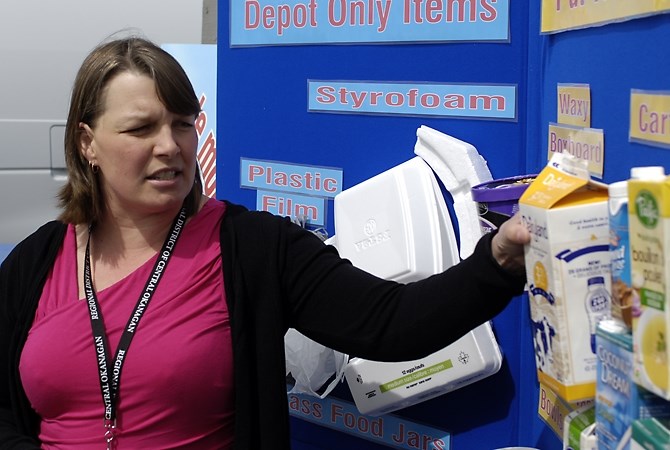
FILE PHOTO - Waste reduction facilitator Cynthia Coates goes over which items can be recycled curb-side and which will have to be taken to a depot after May 19, 2014.
(ADAM PROSKIW / iNFOnews.ca)
August 07, 2018 - 6:00 PM
KELOWNA - As much as 500 tonnes of contaminated recyclables may be sitting in the storage yards of private local waste contractors, the victims of a collapse in the international market for the materials.
While none of the material has ended up at the Glenmore landfill — one contractor asked but was refused — utility services manager Kevin Van Vliet says the problem of selling collected recyclables, contaminated or not, is a growing concern for municipalities.
“We are still having success with our system, however we are getting a lot more pressure on recycling quality, which could end up with municipalities receiving fines or surcharges on our materials,” Van Vliet said.
He did not know the number of private companies involved in recycling in Kelowna but it is an allowable use in a number of commercial and industrial zones.
Even fines haven’t proven a guaranteed way of stopping things like unopened milk containers and half-full wine bottles from ruining loads of recycled materials.
An industry representative recently told board members of the Regional District of Okanagan Similkameen that fines as high as $400 a load weren’t stopping the contractor’s customers from contaminating their loads.
According to Waste Connections of Canada’s B.C. Interior sales manager Geoff Goodman, the Chinese government began refusing contaminated loads last fall, causing an immediate ripple affect around the world.
Van Vliet said he doesn’t know how many private recyclers are in Kelowna but predicts problems in coming months for private businesses trying to recycle.
“It will be more and more difficult for commercial properties to find a company to collect the same level of recylables as we have seen in the past,” he said.
Within Kelowna, Van Vliet said operators of the residential recycling collection have also experienced contamination problems.
“We are working to improve quality so we are not (ending up) in a similar situation,” he said.
To contact a reporter for this story, email John McDonald or call 250-808-0143 or email the editor. You can also submit photos, videos or news tips to the newsroom and be entered to win a monthly prize draw.
We welcome your comments and opinions on our stories but play nice. We won't censor or delete comments unless they contain off-topic statements or links, unnecessary vulgarity, false facts, spam or obviously fake profiles. If you have any concerns about what you see in comments, email the editor in the link above.
News from © iNFOnews, 2018